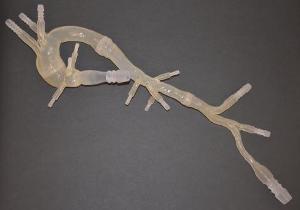MATERIALISE was awarded funding from the European Union for its role in improving 3D printed vascular phantom models in the CASCADE Project. This project aims to help develop a new line of steerable and intelligent catheters which will be able to identify risk-prone regions in the patient’s blood vessel.
With this information, these smart catheters will actively modify their trajectory within the vascular tree to reduce potential complications. Materialise collaborates with seven international institutes, including the Robot-Assisted Surgery Group from the KU Leuven who is coordinating the project.

It is estimated that in 2013 over 2.7 million cardiac catheterizations have been performed in the United States alone. This number continues to grow as catheter-based interventions become the preferred approach. Though often much less invasive than alternative treatments, there is still a risk associated with these procedures. There is a risk of dislodging plaque or calcium into the circulatory system as well as the fear of damaging, rupturing or penetrating the arterial walls.
With a catheter that tracks and senses the middle of the channel, avoids artery walls and notifies the clinician of danger; many of these complications may be avoided. Developing this type of ‘intelligent’ catheter is the goal of the CASCADE Project. Given the advanced and experimental nature of the project, having a realistic testing environment is key for the succes of the project.
In order to create a realistic testing environment, Materialise used its Mimics Innovation Suite of software to create a patient-specific benchtop model. The patient’s CT images were imported, segmented and converted in Mimics to create a 3D digital model of the patient’s anatomy. The anatomy was then sectioned into four modular, interlocking components designed using Materialise’s 3-matic digital CAD program. Components are attached together to create a model that can be used to simulate the entire transfemoral approach from the groin through the aorta and up to the aortic valve.
Researchers have the option to introduce other possible pathologies into the testing environment as well. One module may be replaced with a component illustrating an aneurysm, an anatomy with extensive calcifications, or even an anatomy with abnormal tortuosity. This approach is even ideal for teaching future interventionalists, allowing current practitioners to prepare for First-In-Human trials and also for conducting validation of FEA and CFD analyses with or without a device in place.
The CASCADE Project team is conducting their research on a patient-specific model that was prepared and 3D printed by Materialise using their proprietary HeartPrint® Flex material. HeartPrint® Flex has been validated to be in line with the distensibility of arterial vessels and is thus ideally suited for this purpose. The material gives the model a natural feel while realistically pulsing when attached to a pump to simulate the blood flow. This level of realism is essential to validate control algorithms as the catheter will encounter a similar, highly dynamic environment when moving up through the vascular tree.
Though having a patient-specific model already provides a great benefit compared to traditional methods with cylindrical glass tubes, many medical device companies are going further by using Anatomical Data Mining (ADaMTM) services from Materialise. Using an extensive database of medical images, Materialise is able to create population representative bench models from tens or hundreds of scans. Testing devices in anatomy that matches targeted patient populations provides vital feedback to companies while meeting new regulatory requirements. Medical device companies using this type of benchtop model can proceed to animal testing with confidence, knowing that their device has already demonstrated deployment effectiveness in the model.
The CASCADE Project was recently reviewed by leading international scientists and a representative from the European Union, from which the project receives funding. The overall feedback was very positive and a green light was given to further ramp-up developments in the coming years. By funding this project, the EU is enabling advanced research in this critical area, helping companies grow through innovation and creating job opportunities in the field of medicine.
For more information or to learn more, please visit the CASCADE Project website, the Materialise HeartPrint® website and catalog or contact Materialise.